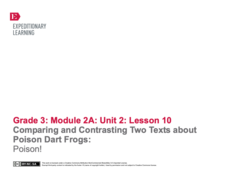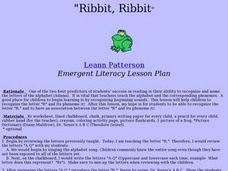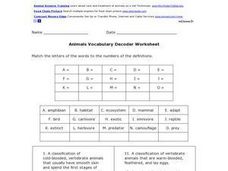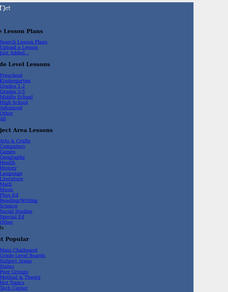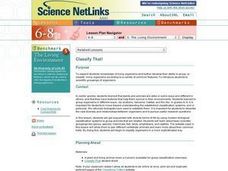EngageNY
Comparing and Contrasting Two Texts about Poison Dart Frogs: Eggs and Tadpoles
Poison Dart Frog babies are the focus of a instructional activity that challenges scholars to compare and contrast two informational texts. Beginning with a read-aloud, followed by a discussion, readers complete a practice page that...
EngageNY
Comparing and Contrasting Two Texts about Poison Dart Frogs: Poison!
Scholars compare and contrast two informational texts about Poison Dart Frogs. A brief vocabulary review and discussion lead the way to a two-part close reading—the first reading for gist the second reading for details. Followed by a...
American Museum of Natural History
Identification Adventure
Put all the pieces together. After a skeleton is put together, pupils play the scientist to determine the type of animal they have by using a classification tree to narrow down the identity. After each decision, they gain advice from an...
Curated OER
Ribbit! Ribbit!
Students research a frog's life cycle and habitat using books, the Internet and lecture. Students make origami frogs, write letters to Toad from Arnold Lobel's "Frog and Toad" and participate in a simulated camouflage activity.
Curated OER
Key Words Animals
In this science worksheet, students find the definitions for the words listed and write down key important facts for each term listed.
Curated OER
A Frog's Life Story
Students examine a frog's life cycle. In this amphibians lesson, students read a book about frogs and discuss how frogs are born and how they grow. Students complete worksheets on the life cycle of the frog, and hold a discussion on the...
Curated OER
Animals Vocabulary Decoder Worksheet
Add some decoding to your scholar's review of basic life science terms in this decorder activity, where students match 15 words to their definitions. Words such as mammal and amphibian must be matched to their written definition. The...
Curated OER
Where do Butterflies Come From?
After tapping into their memories or experiences of baby animals, viewers delve into the insect life cycle of a butterfly and the amphibian life cycle of a frog. When exploring life cycles, show this presentation to your elementary life...
Curated OER
Science: Vocabulary Memory Game
Fourth graders increase their comprehension of science terms by playing a vocabulary matching game. In small groups, they take turns trying to match vocabulary terms with the correct definitions. Missed words are added to the students'...
Curated OER
Animal Classification
In this animals worksheet, students match the words in the first column to the statement that best matches. The terms are associated with the different groups of animals. Students must match 17 terms.
Curated OER
Classifying Critters
In this classification worksheet, pupils describe the characteristics of the 5 groups of vertebrates and then complete 2 short answer questions.
Curated OER
Mapping Where Animals Live
In this animal mapping worksheet, students read a short passage about amphibians and reptiles in New York State, then use a set of maps to answer related questions.
Curated OER
Frogs and Toads Are Different
Second graders identify the unique characteristics of frogs and toads. Through Internet research and reading the book Frog and Toad are Friends by Arnold Lobel, 2nd graders compare and contrast the two amphibians.
Curated OER
Fishes
In this fish worksheet, students will review the characteristics of fish by comparing the jaws, skeleton, and fertilization of each fish class. Then students will use a phylogenetic tree to compare the groups of fish to ancestral...
Curated OER
Is Climate Change Good for Frogs?
Pupils fill out a chart on how climate change would affect them and things around them. In this climate change lesson plan, students discuss how global warming affects them and amphibians and then fill out the chart that goes with it.
Curated OER
Reptiles
In this reptiles learning exercise, students will compare the characteristics of reptiles with the characteristics of amphibians to complete 2 short answer questions.
Curated OER
Frog Or Toad?
In this expository comprehension worksheet, students read a 1-page informational article about frogs and toads, answer short answer questions, and fill out a Venn diagram to compare the two amphibians.
Curated OER
Classify That!
Young scholars get acquainted with diverse forms of life by using modern biological classification systems to group animals that are related. They explore basic scientific groupings like genus, species, mammals, fish, birds, amphibians,...
Curated OER
Classify That!
Learners explore diverse forms of life by using modern biological classification systems to group animals that are related. Students then study basic scientific groupings like genus, species, mammals, fish, birds, amphibians, and...
Curated OER
Lizard and Bullfrog
In this science worksheet, students compare a lizard and an amphibian. They answer several short questions and color in the pictures.
Curated OER
Connect the Dots
In this connect the dots worksheet, students connect the dots to link the numbers to reveal an amphibian that is known for its call.
Curated OER
Animal Word Search
In this animal word search learning exercise, students locate the following words in the word search puzzle: damselfly, duckweed, mallard, newt, kingfisher, otter, mayfly, leech, amphibian, salmon, and dipper.
Curated OER
Animal Classification
Students recognize the six groups of animals (Mammals, fish, birds, reptiles, amphibians and arthropods) and their characteristics. In this animal characteristics lesson, students sort animals by their traits. Students cut and paste...
Curated OER
Herps and Humans
Students compare and contrast the similarities and differences between the internal organs of herps--reptiles and amphibians--and humans.
Other popular searches
- Reptiles and Amphibians
- Amphibians With Worksheets
- Fish and Amphibians
- Reptiles Amphibians
- Amphibians and Reptiles K 2
- Frogs and Amphibians
- Reptiles & Amphibians
- Animal Needs Amphibians
- Amphibians That Hibernate
- Amazing Amphibians
- Types of Amphibians
- Amphibians With



